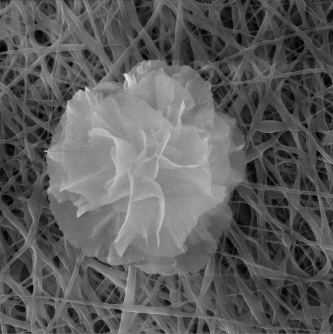A carnation-like nanostructure could someday be used in bandages to promote wound healing. Researchers report in ACS Applied Bio Materials that laboratory tests of their nanoflower-coated dressings demonstrate antibiotic, anti-inflammatory and biocompatible properties. They say these results show these tannic acid and copper(II) phosphate sprouted nanoflower bandages are promising candidates for treating infections and inflammatory conditions.
Nanoflowers are tiny, self-assembling structures. But their large surface area provides plenty of space to attach drug molecules, making the flowers particularly suitable for delivering medications. For their bandage blooms, Fatemeh Ahmadpoor, Pier Francesco Ferrari and colleagues chose copper(II) phosphate and tannic acid because of the antibiotic and anti-inflammatory properties of both reagents. After growing their flowers in a saline solution, the researchers attached the bioinspired structures onto strips of electrospun nanofiber fabric. In tests, the nanoflower-coated bandages inactivated a broad spectrum of cultured bacteria (including E. coli, Pseudomonas aeruginosa and Staphylococcus aureus) and their antibiotic-resistant biofilms, scavenged reactive oxygen species, and didn’t damage lab-grown human cells.
Ahmadpoor and Ferrari say these nanoflower-coated bandages represent a breakthrough advancement by providing a natural, cost-effective and highly efficient solution for combating infections and accelerating wound healing, with the potential to redefine treatment standards.
The authors acknowledge funding from the Italian Ministry of University and Research.
If our reporting has informed or inspired you, please consider making a donation. Every contribution, no matter the size, empowers us to continue delivering accurate, engaging, and trustworthy science and medical news. Independent journalism requires time, effort, and resources—your support ensures we can keep uncovering the stories that matter most to you.
Join us in making knowledge accessible and impactful. Thank you for standing with us!

